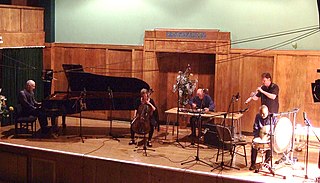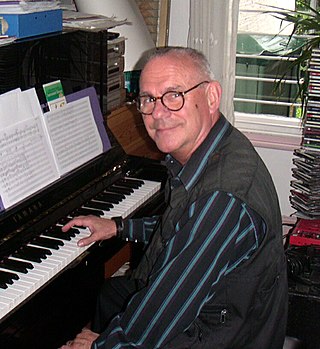
Michael Laurence Nyman, CBE is an English composer, pianist, librettist, musicologist, and filmmaker. He is known for numerous film scores, and his multi-platinum soundtrack album to Jane Campion's The Piano. He has written a number of operas, including The Man Who Mistook His Wife for a Hat; Letters, Riddles and Writs; Noises, Sounds & Sweet Airs; Facing Goya; Man and Boy: Dada; Love Counts; and Sparkie: Cage and Beyond. He has written six concerti, five string quartets, and many other chamber works, many for his Michael Nyman Band. He is also a performing pianist. Nyman prefers to write opera over other forms of music.

The toy piano, also known as the kinderklavier, is a small piano-like musical instrument. Most modern toy pianos use round metal rods, as opposed to strings in a regular piano, to produce sound. The U.S. Library of Congress recognizes the toy piano as a unique instrument with the subject designation, Toy Piano Scores: M175 T69. The most famous example of a dedicated composition for the instrument is the "Suite for Toy Piano" (1948) by John Cage.
Cornelius Cardew was an English experimental music composer, and founder of the Scratch Orchestra, an experimental performing ensemble. He later rejected experimental music, explaining why he had "discontinued composing in an avantgarde idiom" in his own programme notes to his Piano Album 1973.

AMM was a British free improvisation group that was founded in London, England, in 1965. The group was initially composed of Keith Rowe on guitar, Lou Gare on saxophone, and Eddie Prévost on drums. The three men shared an interest in exploring music beyond the boundaries of conventional jazz, as in free jazz and free improvisation. AMM never achieved widespread popularity, but have been influential in improvised music. Most of their albums have been released by Matchless Recordings, which is run by Eddie Prévost. In a 2001 interview, Keith Rowe was asked if "AMM" was an abbreviation. He replied, "The letters AMM stand for something, but as you probably know it's a secret!"
Howard While Skempton is an English composer, pianist, and accordionist.

John Tilbury is a British pianist. He is considered one of the foremost interpreters of Morton Feldman's music, and since 1980 has been a member of the free improvisation group AMM.

A rehearsal is an activity in the performing arts that occurs as preparation for a performance in music, theatre, dance and related arts, such as opera, musical theatre and film production. It is undertaken as a form of practising, to ensure that all details of the subsequent performance are adequately prepared and coordinated. The term rehearsal typically refers to ensemble activities undertaken by a group of people. For example, when a musician is preparing a piano concerto in their music studio, this is called practising, but when they practice it with an orchestra, this is called a rehearsal. The music rehearsal takes place in a music rehearsal space.
Michael Edward Parsons is a British composer. Since the 1960s, when he met Cornelius Cardew and helped found the Scratch Orchestra, Parsons has been strongly associated with the English school of experimental music. He was born in Bolton and studied at St John's College, Oxford before taking up composition lessons under Peter Racine Fricker at the Royal College of Music in London in 1961. In the 1960s he met Cornelius Cardew; Parsons attended Cardew's experimental music classes at Morley College since 1968. In 1969 Cardew, Parsons and fellow composer Howard Skempton founded the Scratch Orchestra, an experimental free ensemble devoted to performing contemporary music. The Orchestra broke up in early 1970s, partly as a result of the politization led by Cardew. Parsons was among the Orchestra members who refused to be associated with the Maoist politics Cardew was propagating, and left. In 1970 Parsons started working as visiting lecturer in the Fine Art department of the Portsmouth Polytechnic and in the Slade School of Art, University College London. In 1974 he and Skempton formed a duo to perform their own works. In 1996–97 Parsons was a bi-fellow at Churchill College, Cambridge. During this time he organised concerts at Kettle's Yard, Cambridge. Since the early 1960s Parsons has also been active as a writer on music; his writings include a number of important articles on contemporary English composers.
The Scratch Orchestra was an experimental musical ensemble founded in the spring of 1969 by Cornelius Cardew, Michael Parsons and Howard Skempton.

John White is an English experimental composer and musical performer. He invented the early British form of minimalism known as systems music, with his early Machines.

Stephen Rowley Montague is an American composer, pianist and conductor who grew up in Idaho, New Mexico, West Virginia and Florida.
Dave Smith is an English composer, arranger and musical performer. Since 1971 he has been associated with the English school of experimental music.

Edwin John Prévost is an English percussionist who founded the free improvisation group, AMM.

Christopher Hobbs is an English experimental composer, best known as a pioneer of British systems music.
Indeterminacy is a composing approach in which some aspects of a musical work are left open to chance or to the interpreter's free choice. John Cage, a pioneer of indeterminacy, defined it as "the ability of a piece to be performed in substantially different ways".
Hugh Shrapnel is an English composer of contemporary classical music and oboist. He was a student of Cornelius Cardew and a member of the Scratch Orchestra. He also co-founded the Promenade Theatre Orchestra in 1969.
The Experimental Music Catalogue was founded in 1968 by Christopher Hobbs in order to provide an outlet for new music by composers of the English experimental movement, Publications appeared mainly as generic anthologies, such as the Verbal Anthology, String Anthology, Rhythmic Anthology and the Scratch Anthology of Compositions. These anthologies featured music by British composers such as Cornelius Cardew, Hugh Shrapnel, Howard Skempton, Gavin Bryars, John White, and other experimental composers, including those in the Scratch Orchestra, but also others, including Robert Ashley and Terry Jennings.
David Anthony Ahern was an Australian composer and music critic, who became a prominent artist in the avant-garde genre after his best-known work, Ned Kelly Music was released and performed at the Sydney Proms music series.
Ensemble Pieces is a 1975 classical music work by Christopher Hobbs, John Adams and Gavin Bryars.

Laurie Scott Baker was a British composer and musician of Experimental and Electronic music. He was a pioneer of live electronics and graphic scores from the 1960s.









